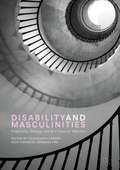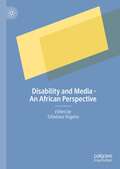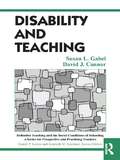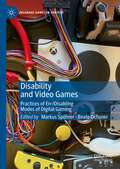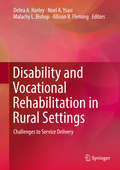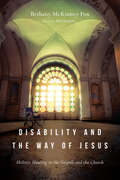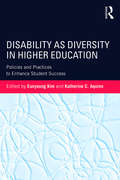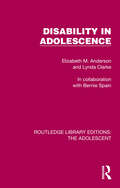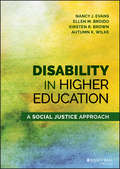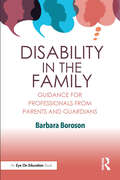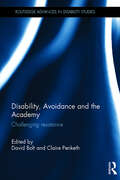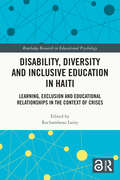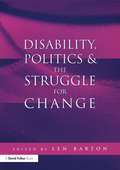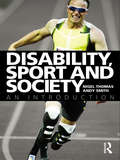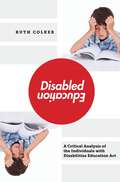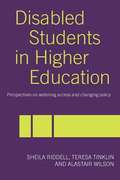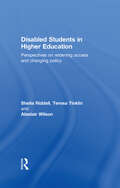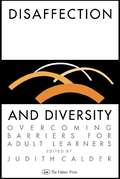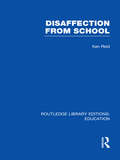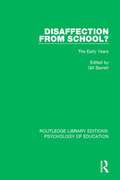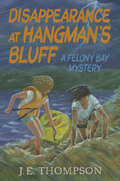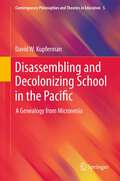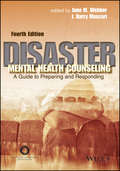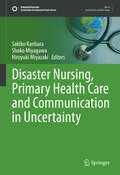- Table View
- List View
Disability and Masculinities
by Barbara Pini Cassandra Loeser Vicki CrowleyIn recent years, attending to diversity in the cultivation of embodied identity has been given additional impetus as a result of intersectionality theory. Despite this, a key gap remains in terms of knowledge about masculinity and disability. This book addresses this lacuna through ten empirical chapters organised through the inter-related themes of corporeality, pedagogy and the critique of otherness. Each of the chapters positions the subject of masculinity and disability as a site of cultural pedagogy by affirming different ways of knowing of masculinity beyond dominant ideologies that normalise a particular masculine body and relegate disabled masculinities to the position of abnormal 'Other'. Part One focuses on pedagogy. Through the materialities of 'medicalized colonialism', imprimaturs of 'relational genealogies', 'compounding differences' and an analytical exposition of some of the neo-colonial conditions of the Global South within spatially-considered places of the Global North, Chapter 1 examines the denial of human rights to the Indigenous Anishinaabe community of Shoal Lake 40 in Canada. Chapter 1 theorises masculine corporeality in terms that take seriously First Nations', national and transnational body politics seriously. Chapter 2 examines the ways that movement and affect serve as a form of pedagogy for boys with autism spectrum in schools. Part Two's focus on corporeality includes an examination of the nexus of disability and diagnosis in the context of transgender men's experiences of mental health, and a discussion of the ways that intersex individuals who identify as men and have experienced 'genital normalising surgery' actively negotiate pluralised masculinities. The focus on media in Part Three encompasses a study of the mis-interpellation of the disabled male subject in Australian male literature, research on the discursive strategies utilised in media representations of disabled veterans in Turkey, and an analysis of the political implications of depictions of masculinity, disability and sexualities in a variety television program. Part Four's theme of self-stylisation takes up the questions of men's reconstructions of masculinity in light of Lyme Disease, the potential pleasures of heterosexuality for young men with a hearing disability in the realm of Australian-Rules Football, and the diverse ways that disabled men negotiate patriarchal masculinity in intimate relationships.
Disability and Media - An African Perspective
by Tafadzwa RugohoThis book seeks to expand some of the existing, often western and Global North facing, scholarship in the area of Disability and Media Studies to include African perspectives. Featuring predominantly Africa-based contributors, it studies an array of topics on disability and media in Africa, including issues of social media, media ethics, including marginalised voices in the media, and disability representation in the media.
Disability and Teaching (Reflective Teaching and the Social Conditions of Schooling Series)
by David Connor Susan GabelDisability and Teaching highlights issues of disability in K-12 schooling faced by teachers, whoare increasingly accountable for the achievement of all students regardless of the labelsassigned to them. It is designed to engage prospective and practicing teachers in examining theirpersonal theories and beliefs about disability and education. Part I offers four case studies dealing with issues such as inclusion, over-representation inspecial education, teacher assumptions and biases, and the struggles of novice teachers. Thesecases illustrate the need to understand disability and teaching within the contexts of school,community, and the broader society and in relation to other contemporary issues facing teachers.Each is followed by space for readers to write their own reactions and reflections, educators’dialogue about the case, space for readers’ reactions to the educators’ dialogue, a summary, andadditional questions. Part II presents public arguments representing different views about thetopic: conservative, liberal-progressive, and disability centered. Part III situates the authors’personal views within the growing field of Disability Studies in education and provides exercisesfor further reflection and a list of resources. Disability and Teaching is the 8th volume in the Reflective Teaching and the Social Conditions ofSchooling Series, edited by Daniel P. Liston and Kenneth M. Zeichner. This series of small,accessible, interactive texts introduces the notion of teacher reflection and develops it in relationto the social conditions of schooling. Each text focuses on a specific issue or content area inrelation to teaching and follows the same format. Books in this series are appropriate for teachereducation courses across the curriculum.
Disability and Video Games: Practices of En-/Disabling Modes of Digital Gaming (Palgrave Games in Context)
by Markus Spöhrer Beate OchsnerThis collection intends to fill a long overdue research gap on the praxeological aspects of the relationships between disabilities, accessibility, and digital gaming. It will focus on the question of how Game Studies can profit from a Disability Studies perspective of en-/disabling gaming and issues of disability, (in)accessibility and ableism, and vice versa. Instead of departing from the medical model of disability that informs a wide range of publications on “disabled” gaming and that preconceives users as either “able-bodied,” “normal” or as “disabled,” “deficit,” or “unable to play,” our central premise is that dis/ability is not an essential characteristic of the playing subject. We rather intend to analyze the complex infrastructures of playing, i.e., the complex interplay of heterogeneous human and non-human actors, that are en- or disabling.
Disability and Vocational Rehabilitation in Rural Settings
by Debra A. Harley Noel A. Ysasi Malachy L. Bishop Allison R. FlemingThis first-of-its-kind textbook surveys rehabilitation and vocational programs aiding persons with disabilities in remote and developing areas in the U. S. and abroad. Contributors discuss longstanding challenges to these communities, most notably economic and environmental obstacles and ongoing barriers to service delivery, as well as their resilience and strengths. Intersections of health, social, structural, and access disparities are shown affecting rural disabled populations such as women, racial and sexual minorities, youth, and elders. In terms of responses, a comprehensive array of healthcare and health policy solutions and recommendations is critiqued with regard to health, employment, and service effectiveness outcomes. Included among the topics: Healthcare initiatives, strategies, and challenges for people with disabilities in rural, frontier, and territory settings. Challenges faced by veterans residing in rural communities. The Asia and Pacific region: rural-urban impact on disability. Challenges after natural disaster for rural residents with disabilities. Meeting the needs of rural adults with mental illness and dual diagnoses. Capacity building in rural communities through community-based collaborative partnerships. Disability and Vocational Rehabilitation in Rural Settings makes a worthy textbook for graduate students and upper-level undergraduates in the fields of social work, community and environmental psychology, public health, sociology, education, and geography. Its professional audience also includes vocational rehabilitation counselors serving these dynamic populations.
Disability and the Way of Jesus: Holistic Healing in the Gospels and the Church
by Bethany McKinney FoxWhat does healing mean for people with disabilities? The Gospels are filled with accounts of Jesus offering physical healing. But even as churches today seek to follow the way of Jesus, people with disabilities all too often experience the very opposite of healing and life-giving community: exclusion, judgment, barriers. Misinterpretation and misapplication of biblical healing narratives can do great damage, yet those who take the Bible seriously mustn't avoid these passages either. Bethany McKinney Fox believes that Christian communities are better off when people with disabilities are an integral part of our common life. In Disability and the Way of Jesus, she considers how the stories of Jesus' healings can guide us toward mutual thriving. How did Jesus' original audience understand his works of healing, and how should we relate to these texts today? After examining the healing narratives in their biblical and cultural contexts, Fox considers perspectives from medical doctors, disability scholars, and pastors to more fully understand what Jesus does as he heals and how he points the way for relationships with people with disabilities. Personal reflections from Christians with disabilities are featured throughout the book, which concludes with suggestions for concrete practices adaptable to a variety of church settings. Bridging biblical studies, ethics, and disability studies with the work of practitioners, Fox provides a unique resource that is both theologically grounded and winsomely practical. Disability and the Way of Jesus provides new lenses on holistic healing for scholars, laypeople, and ministry leaders who care about welcoming all people as Jesus would.
Disability as Diversity in Higher Education: Policies and Practices to Enhance Student Success
by Eunyoung Kim Katherine C. AquinoAddressing disability not as a form of student impairment—as it is typically perceived at the postsecondary level—but rather as an important dimension of student diversity and identity, this book explores how disability can be more effectively incorporated into college environments. Chapters propose new perspectives, empirical research, and case studies to provide the necessary foundation for understanding the role of disability within campus climate and integrating students with disabilities into academic and social settings. Contextualizing disability through the lens of intersectionality, Disability as Diversity in Higher Education illustrates how higher education institutions can use policies and practices to enhance inclusion and student success.
Disability in Adolescence (Routledge Library Editions: The Adolescent)
by Elizabeth M. Anderson Lynda ClarkeFor all the work on disability in previous years, there had been surprisingly little done on a subject of central importance – the social and psychological needs of teenagers with disabilities. Originally published in 1982, the purpose of this timely book was both to review the literature and to report an extensive study of the nature of the psychological problems, the quality of social life and the adequacy of the services available to a substantial group of teenagers with disabilities in the last years at school, with a follow-up study of half their number a year later. The authors show that many of these teenagers, including those with a mild disability, are often unhappy, worried and isolated from their peers. While the majority of the teenagers with disabilities, whether in ordinary or special schools, made friends at school, these friendships were rarely sustained outside. After leaving school the degree of social isolation is as great, and often worse. Among these teenagers the incidence of psychological problems was three to four times higher than for a control group, the most common being worry, depression, misery, fearfulness and lack of self-confidence and self-esteem. For the most part, the teenagers with disabilities were likely to be immature and ill-prepared to cope with adult life. These findings underline the need for a counselling service while the teenagers are still at school, and supporting services when they have left. Like other teenagers, those in this study were unprepared for the possibility of not having a job, and had not thought how to organize their lives if a job was not available or feasible. The authors draw attention to the large proportion of people with disabilities without occupation after leaving school, and the high dissatisfaction with day centres. Perhaps their most important finding is the need to rationalize the piecemeal and overlapping provision of help for school-leavers with disabilities. In the meantime, their book provides a wealth of information of direct use to those concerned with teenagers with disabilities and their families, whether in school provision, careers advice, work placement and alternatives to work, social services, counselling, medical services and further education. This book is a re-issue originally published in 1982. The language used is a reflection of its era and no offence is meant by the Publishers to any reader by this re-publication.
Disability in Higher Education: A Social Justice Approach
by Nancy J. Evans Ellen M. Broido Autumn K. Wilke Kirsten R. BrownCreate campuses inclusive and supportive of disabled students, staff, and faculty Disability in Higher Education: A Social Justice Approach examines how disability is conceptualized in higher education and ways in which students, faculty, and staff with disabilities are viewed and served on college campuses. Drawing on multiple theoretical frameworks, research, and experience creating inclusive campuses, this text offers a new framework for understanding disability using a social justice lens. Many institutions focus solely on legal access and accommodation, enabling a system of exclusion and oppression. However, using principles of universal design, social justice, and other inclusive practices, campus environments can be transformed into more inclusive and equitable settings for all constituents. The authors consider the experiences of students, faculty, and staff with disabilities and offer strategies for addressing ableism within a variety of settings, including classrooms, residence halls, admissions and orientation, student organizations, career development, and counseling. They also expand traditional student affairs understandings of disability issues by including chapters on technology, law, theory, and disability services. Using social justice principles, the discussion spans the entire college experience of individuals with disabilities, and avoids any single-issue focus such as physical accessibility or classroom accommodations. The book will help readers: Consider issues in addition to access and accommodation Use principles of universal design to benefit students and employees in academic, cocurricular, and employment settings Understand how disability interacts with multiple aspects of identity and experience. Despite their best intentions, college personnel frequently approach disability from the singular perspective of access to the exclusion of other important issues. This book provides strategies for addressing ableism in the assumptions, policies and practices, organizational structures, attitudes, and physical structures of higher education.
Disability in the Family: Guidance for Professionals from Parents and Guardians
by Barbara BorosonThis insightful guide shows professionals how to collaborate with parents and guardians of children with disabilities in empathic, respectful, knowledgeable, and supportive ways. Packed with first-hand accounts and advice from parents and guardians, this book shines a light on lived experiences and reveals paths toward meeting families where they are in order to move forward together. Boroson emphasizes that appreciating the real needs of these families is a crucial step beyond mere adherence to a generic set of professional best practices or principles. Whether working in the field of medicine, education, law, mental health, or related services—in any capacity—readers will come away with the holistic knowledge, inclusive language, productive strategies, and differentiated understanding needed to work effectively with the diverse families they serve. Included is a robust array of resources for families, such as books, articles, associations, organizations, and support networks, along with a website for additional, up-to-date resources.
Disability, Avoidance and the Academy: Challenging Resistance (Routledge Advances in Disability Studies)
by David Bolt Claire PenkethDisability is a widespread phenomenon, indeed a potentially universal one as life expectancies rise. Within the academic world, it has relevance for all disciplines yet is often dismissed as a niche market or someone else’s domain. This collection explores how academic avoidance of disability studies and disability theory is indicative of social prejudice and highlights, conversely, how the academy can and does engage with disability studies. This innovative book brings together work in the humanities and the social sciences, and draws on the riches of cultural diversity to challenge institutional and disciplinary avoidance. Divided into three parts, the first looks at how educational institutions and systems implicitly uphold double standards, which can result in negative experiences for staff and students who are disabled. The second part explores how disability studies informs and improves a number of academic disciplines, from social work to performance arts. The final part shows how more diverse cultural engagement offers a way forward for the academy, demonstrating ways in which we can make more explicit the interdisciplinary significance of disability studies – and, by extension, disability theory, activism, experience, and culture. Disability, Avoidance and the Academy: Challenging Resistance will interest students and scholars of disability studies, education studies and cultural studies.
Disability, Diversity and Inclusive Education in Haiti: Learning, Exclusion and Educational Relationships in the Context of Crises (Routledge Research in Educational Psychology)
by Rochambeau LainyThis book examines disability, diversity, and schooling exclusion in Haiti in the wake of Hurricane Matthew. Defending a social and anthropological conception of disability as a consequence of any situation that makes a subject uncomfortable and unable to live or act properly, the book explores the difficulties that disabled children face within the school system and considers how social exclusion provokes and exacerbates educational exclusion. With contributions from linguists, educational sociologists, educational psychologists, educators, and historians, the chapters focus on a range of phenomena such as the balance of languages used for teaching, gender equity, associated disorders, and the experiences of left-handed and deaf students. Ultimately, the authors demonstrate how the educational relationships built and practiced in school influence the perceptions of people with disabilities, with respect to both singular contexts and pedagogical practices. As such, it represents an important study of the relationship between school exclusion, disability, and those with precarious socio-familial conditions, and how they can be conceptualized and addressed in the context of crises. It will appeal to scholars, researchers, and academics with interests in diversity and inclusive education, pedagogy, crisis education, and educational psychology. Chapters 1, 3, 7, and 8 of this book are available for free in PDF format as Open Access from the individual product page at www.routledge.com. They have been made available under a Creative Commons Attribution-Non Commercial-No Derivatives 4.0 license.
Disability, Politics and the Struggle for Change
by Len BartonThis book seeks to explore how disability is understood and the position and experiences of disabled people both within and across different societies. The authors explore the question of politics in relation to specific struggles, providing a wealth of insights and ideas, and examine the nature and value of a social model of disability. They criticize exclusionary barriers while advancing a more democratic and participatory society based on principles of equality, offer cross-cultural insights and present stimuli for debate and further research. The text is accessible, topical, and provides new and innovatory thinking. This book will appeal to undergraduate and postgraduate students, lecturers and researchers with interests in education, social policy, sociology and disability studies.
Disability, Sport and Society: An Introduction
by Nigel Thomas Andy SmithDisability sport is a relatively recent phenomenon, yet it is also one that, particularly in the context of social inclusion, is attracting increasing political and academic interest. The purpose of this important new text – the first of its kind – is to introduce the reader to key concepts in disability and disability sport and to examine the complex relationships between modern sport, disability and other aspects of wider society. Drawing upon original data from interviews, surveys and policy documents, the book examines how disability sport has developed and is currently organised, and explores key themes, issues and concepts including: disability theory and policy the emergence and development of disability sport disability sport development in local authorities mainstreaming disability sport disability, physical education and school sport elite disability sport and the Paralympic Games disability sport and the media. Including chapter summaries, seminar questions and lists of key websites and further reading throughout, Sport, Disability and Society provides both an easy to follow introduction and a critical exploration of the key issues surrounding disability sport in the twenty-first century. This book is an invaluable resource for all students, researchers and professionals working in sport studies, disability studies, physical education, sociology and social policy. Nigel Thomas is Head of Sport and Exercise at Staffordshire University, UK, where his research focuses on the history, mainstreaming, and media coverage of disability sport. He previously worked for ten years with young disabled people as a sports development officer in local authorities and national governing bodies. Andy Smith is Lecturer in the Sociology of Sport and Exercise at the University of Chester, UK. He is a co-editor of the International Journal of Sport Policy, and a co-author of Sport Policy and Development: A Sociological Introduction, and An Introduction to Drugs in Sport: Addicted to Winning? Both books are published by Routledge (2009).
Disabled Education: A Critical Analysis of the Individuals with Disabilities Education Act
by Ruth ColkerEnacted in1975, the Education for All Handicapped Children Act – now called theIndividuals with Disabilities Education Act (IDEA) provides all children withthe right to a free and appropriate public education. On the face of it, theIDEA is a shining example of law’s democratizing impulse. But is that reallythe case? In Disabled Education, Ruth Colker digs deep beneath theIDEA’s surface and reveals that the IDEA contains flaws that were evident atthe time of its enactment that limit its effectiveness for poor and minoritychildren.Both anexpert in disability law and the mother of a child with a hearing impairment,Colker learned first-hand of the Act’s limitations when she embarked on a legalbattle to persuade her son’s school to accommodate his impairment. Colker wasable to devote the considerable resources of a middle-class lawyer to herstruggle and ultimately won, but she knew that the IDEA would not havebenefitted her son without her time-consuming and costly legal intervention.Her experience led her to investigate other cases, which confirmed hersuspicions that the IDEA best serves those with the resources to advocatestrongly for their children. The IDEAalso works only as well as the rest of the system does: struggling schools thatserve primarily poor students of color rarely have the funds to provideappropriate special education and related services to their students withdisabilities. Through a close examination of the historical evolution of theIDEA, the actual experiences of children who fought for their education incourt, and social science literature on the meaning of “learning disability,”Colker reveals the IDEA’s shortcomings, but also suggests ways in whichresources might be allocated more evenly along class lines.
Disabled Students in Higher Education: Perspectives on Widening Access and Changing Policy
by Sheila Riddell Teresa Tinklin Alastair WilsonThe authors present results gleaned from eight higher education institutions in Great Britain which demonstrate the level of participation by disabled students.
Disabled Students in Higher Education: Perspectives on Widening Access and Changing Policy (Scre Research Report Ser. #No. 85)
by Sheila Riddell Teresa Tinklin Alastair WilsonAs wider access to higher education becomes a top priority for governments in the UK and around the world, this ground-breaking piece of work raises the challenging questions that policy-makers, vice-chancellors and government officials are reluctant to ask. A highly qualified team of authors have closely analyzed rates of participation and the experiences of disabled students in higher education over a two year period. They compare the responses of eight different universities to the new anti-discriminatory practice, contrasting their social profiles, academic missions, support systems for disabled students and approaches for the implementation of change. Change comes under particular scrutiny, with a close examination of each university’s interpretation of ‘reasonable adjustments’, and the extent to which they have modified their campuses and teaching accordingly. Student case studies are used throughout to illustrate the real impact of institutional responses to the legislation. Disabled Students in Higher Education will make fascinating reading for students of education, social policy, politics, and disability studies, and for those working towards accredited university teacher status.
Disaffection And Diversity: Overcoming Barriers For Adult Learners (Education And Alienation Ser. #Vol. 11)
by Judith CalderFirst Published in 1993. Routledge is an imprint of Taylor & Francis, an informa company.
Disaffection From School (Routledge Library Editions: Education)
by Stephen Hester David H Hargreaves Frank J MellorA large number of pupils are, or are liable to become, disaffected with their schooling. In this comprehensive account of the problem, Ken Reid suggests that school can and should do much more to prevent and overcome disaffected behaviour, as manifested by such factors as absenteeism, disruption and underachievement. The book covers disruptive behaviour in its broader context and examines the search for an explanation within schools themselves. Formal and multidisciplinary approaches to the problem are also fully treated. The author has drawn on his considerable school and research experience and the book is well illustrated with examples and case histories. Ken Reid argues that questions about attitudes and approaches in teaching and in pastoral care provoke a continued challenge, and stresses that if such questions are not faced squarely the long-germ prognosis for secondary education in Britain may be bleak. Teachers in training and all those involved in the education and welfare of difficult or disadvantaged children, especially teachers, heads and social workers, will find Disaffection from School both challenging in its analysis and helpful in its suggestions.
Disaffection from School?: The Early Years (Routledge Library Editions: Psychology of Education)
by Gill BarrettOriginally published in 1989, the purpose of this book was to explore the nature and appearance of disaffection and alienation in young children and to seek to understand its significance. It deals with classroom interactions and adult expectations of children, and the context of historical and policy-related perspectives on schools as they relate to the under-8-year-olds. Theories and assumptions about these young children are re-examined, leading to questions on interpretation of behaviours, the appropriateness of practices at the classroom, teacher education and policy levels, and the societal value that was placed on the schooling experience of young children at the time.
Disappearance at Hangman's Bluff (No Series (generic) Ser.)
by J. E. ThompsonIn South Carolina, young friends Abbey and Bee see their neighbor's dog, Yemassee, getting kidnapped by a couple of rough-looking fellas with guns. What does this mean? Abbey knows one thing: if you try to mess with her family, friends, or friends' dogs, you've got trouble on your hands.
Disassembling and Decolonizing School in the Pacific
by David W. KupfermanSchooling in the region known as Micronesia is today a normalized, ubiquitous, and largely unexamined habit. As a result, many of its effects have also gone unnoticed and unchallenged. By interrogating the processes of normalization and governmentality that circulate and operate through schooling in the region through the deployment of Foucaultian conceptions of power, knowledge, and subjectivity, this work destabilizes conventional notions of schooling's neutrality, self-evident benefit, and its role as the key to contemporary notions of so-called political, economic, and social development. This work aims to disquiet the idea that school today is both rooted in some distant past and a force for decolonization and the postcolonial moment. Instead, through a genealogy of schooling, the author argues that school as it is currently practiced in the region is the product of the present, emerging from the mid-1960s shift in US policy in the islands, the very moment when the US was trying to simultaneously prepare the islands for putative self-determination while producing ever-increasing colonial relations through the practice of schooling. The work goes on to conduct a genealogy of the various subjectivities produced through this present schooling practice, notably the student, the teacher, and the child/parent/family. It concludes by offering a counter-discourse to the normalized narrative of schooling, and suggests that what is displaced and foreclosed on by that narrative in fact holds a possible key to meaningful decolonization and self-determination.
Disaster Management Law
by Bhim Charan Roy Md Abdul BarikThis is about Disaster Management Law in Bangladesh.
Disaster Mental Health Counseling: A Guide to Preparing and Responding
by Jane M. Webber J. Barry MascariThis timely book provides current research and skill-building information on Disaster Mental Health Counseling for counselors, educators, students, and mental health responders in agencies, schools, universities, and private practice. Recognized experts in the field detail effective clinical interventions with survivors in the immediate, intermediate, and long-term aftermath of traumatic events. This extensively revised edition, which meets 2016 CACREP Standards for disaster and trauma competencies, is divided into three sections: Disaster Mental Health Counseling Foundations, Disaster and Trauma Response in the Community, and Disasters and Mass Violence at Schools and Universities. Real-world responses to violence and tragedies among diverse populations in a variety of settings are presented, and responders share their personal stories and vital lessons learned through an "In Our Own Words" feature. Each chapter contains discussion questions and case studies are interwoven throughout the text. Requests for digital versions from the ACA can be found on wiley.com. To request print copies, please visit the ACA website here. Reproduction requests for material from books published by ACA should be directed to permissions@counseling.org
Disaster Nursing, Primary Health Care and Communication in Uncertainty (Sustainable Development Goals Series)
by Sakiko Kanbara Shoko Miyagawa Hiroyuki MiyazakiThe primary aim of this textbook is to contribute towards the promotion of human security by educating nurses with a profound understanding of disaster nursing and to conduct innovative research and practices in cooperation. This textbook emphasizes on multi-professional connections; offers knowledge on how Japanese disaster nursing got evolved in changing social contexts and provides various case studies that reflect wonderful practices in the disaster nursing field which have contributed to the Sendai Framework for Disaster Risk Reduction, the UN Sustainable Development Goals, and sustainable human security. Frequent disasters have triggered the need for more trans-disciplinary work, high-level care throughout all phases of a disaster event, and the need for nursing leaders. Apart from hospitals, in local communities, nurses can take a role to mitigate health risks. Being a member of every part of the healthcare system, they can become critically needed leaders in emergency management and disaster preparedness. This work includes a DRR Framework and the application to disaster nursing, information on preparedness and community resilience and on the related disciplines and coordination with disaster nursing. It informs on the challenges in disaster nursing, offers instructional design, education development and research in disaster nursing. Students, professional nurses, clinicians, community health practitioners, health volunteers, disaster support organizations, researchers, and community partners who are involved in the care of disaster survivors can use this resource. Written by distinguished experts with diverse backgrounds of nursing, public health, health informatics, and geography, this book shows how practitioners, researchers, policymakers, and multiple community stakeholders who can collaborate effectively and efficiently to restore primary health care of survivors after a local disaster.
